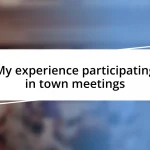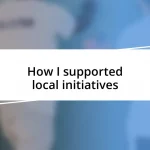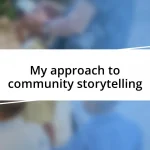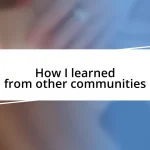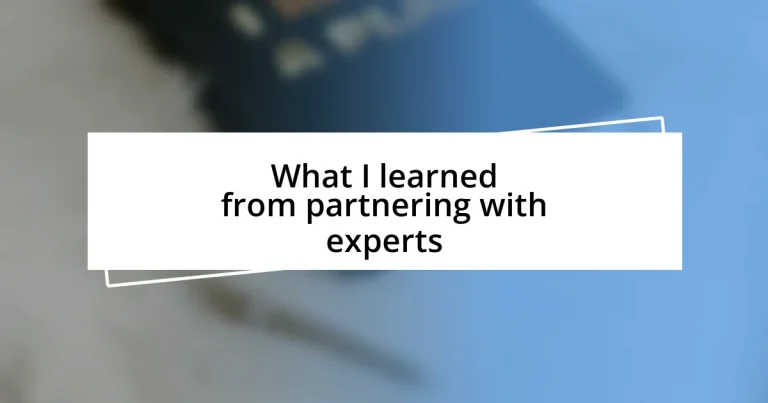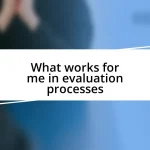Key takeaways:
- Expert partnerships enhance problem-solving by combining diverse perspectives and innovative solutions.
- Establishing trust through open communication, shared vulnerabilities, and reliability is vital for successful collaborations.
- Defining clear roles and expectations at the start improves efficiency and mutual respect in partnerships.
- Measuring success involves assessing the quality of interactions and the lasting impact of relationships beyond immediate project outcomes.
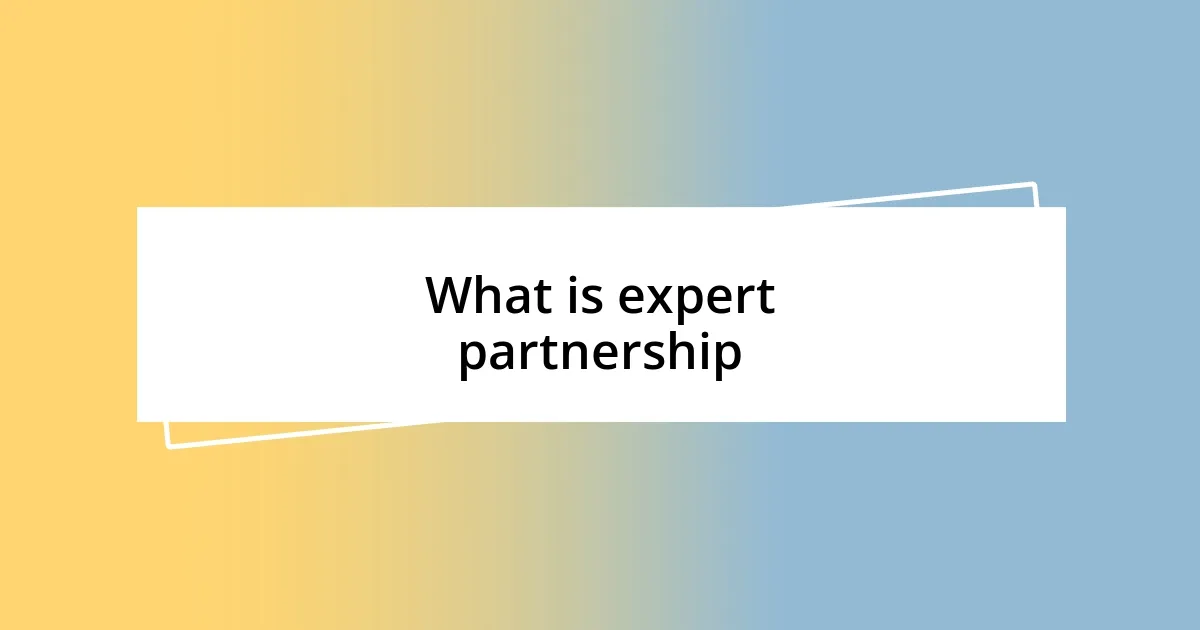
What is expert partnership
Expert partnership, at its core, involves collaborating with individuals who possess specialized knowledge or skills that complement your own. I remember my first experience working with an expert; it was like opening a door to a room filled with possibilities I hadn’t even considered. Have you ever noticed how the right expert can illuminate blind spots in your approach?
When I think about expert partnerships, I reflect on how they offer diverse perspectives and innovative solutions. Engaging with a knowledgeable partner made me realize just how much I could expand my understanding of a subject. It’s fascinating how two minds, blending their expertise, can create something more innovative and effective than either could alone.
Moreover, expert partnerships foster a sense of shared responsibility and accountability. In my recent collaboration, knowing someone was equally invested in the outcome pushed me to strive for excellence. Have you ever felt motivated just by the presence of someone who truly gets it? It’s an indescribable energy that elevates the entire project.
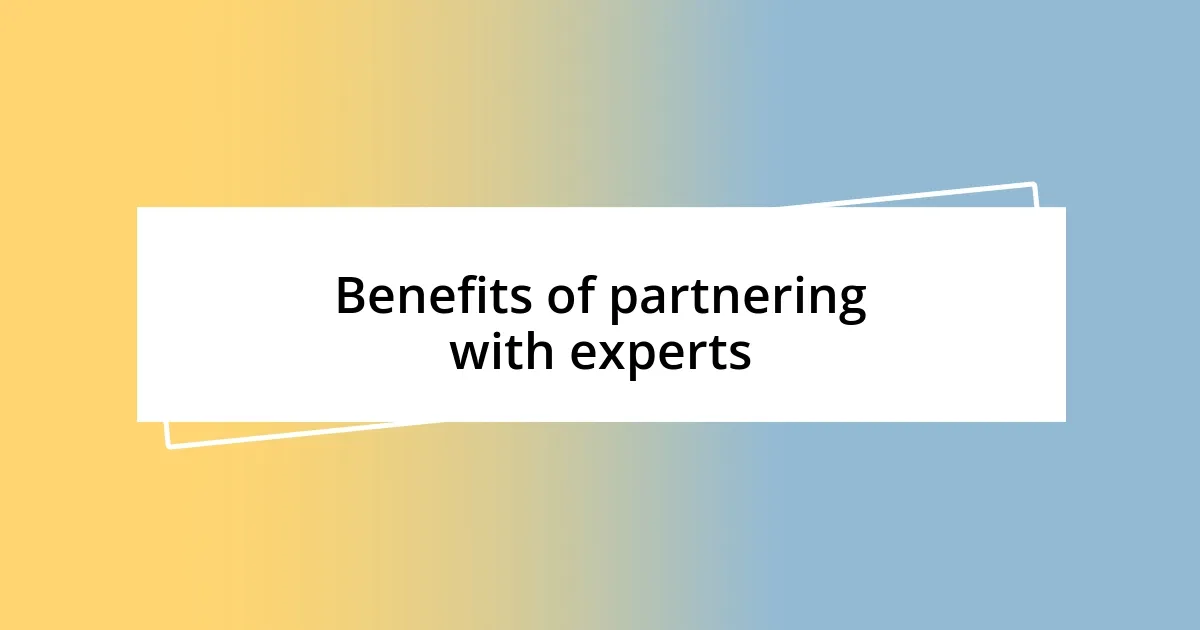
Benefits of partnering with experts
Partnering with experts not only exposes you to new knowledge but also accelerates your project’s progress. In one project, I teamed up with a data analyst. Her ability to dissect complex information and present it straightforwardly transformed how we approached our decisions. I found that her insights not only saved us time but also led us to unexpected solutions that I would have never discovered on my own.
- Enhanced Problem-Solving: Experts often have a wealth of experience navigating challenges, which means they can suggest practical solutions that you might overlook.
- Access to Resources: Collaborating with experienced professionals can grant you access to their network, tools, and research that may otherwise be unavailable to you.
- Shared Learning: Working side by side with someone knowledgeable turns the experience into a valuable learning opportunity, helping you grow in areas you didn’t initially expect.
- Increased Credibility: Partnering with recognized experts can enhance your own credibility and reputation in your field, making it easier to gain respect and trust from clients or peers.
In my experience, every interaction with an expert feels like a mini-masterclass. Their opinions challenge my own notions and push me to dig deeper into my own understanding. Have you ever felt that spark of insight when someone else shares their perspective? The true benefit of these partnerships lies not only in the outcome but also in the journey of growth and discovery they facilitate.
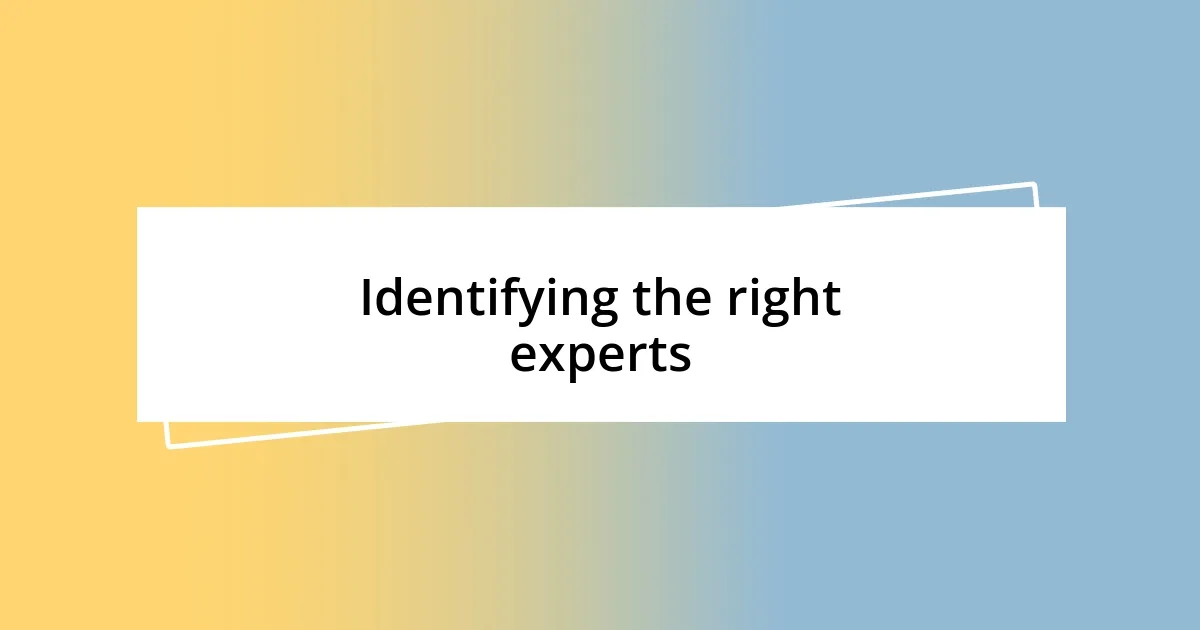
Identifying the right experts
When it comes to identifying the right experts, I’ve learned that clarity about your own needs is crucial. The first step is often to evaluate what skills or knowledge gaps you have. I remember embarking on a project where I assumed I needed a marketing guru, but it turned out that a branding specialist was the key to our success. This realization came from deep reflection on our goals and the outcomes we sought.
Moreover, it’s essential to conduct thorough research on potential candidates. I usually start by exploring their backgrounds and experiences, checking for real-world applications of their expertise. Once, I found an expert through a mutual connection, but it was their hands-on achievements in my area of need that made me confident in partnering with them. You want someone whose experience aligns seamlessly with your specific challenges.
Finally, interpersonal skills cannot be overlooked. An expert’s ability to communicate effectively and empathize can significantly impact the partnership’s success. In working with a consultant once, her approachable nature created an environment where I felt comfortable sharing my ideas and fears. This openness not only enriched our collaboration but also fostered trust, ensuring we both contributed fully to the project.
| Criteria | Importance |
|---|---|
| Clarity on Needs | Essential for targeting the right expert |
| Research | Validates expertise and ensures alignment |
| Interpersonal Skills | Enhances communication and collaboration |
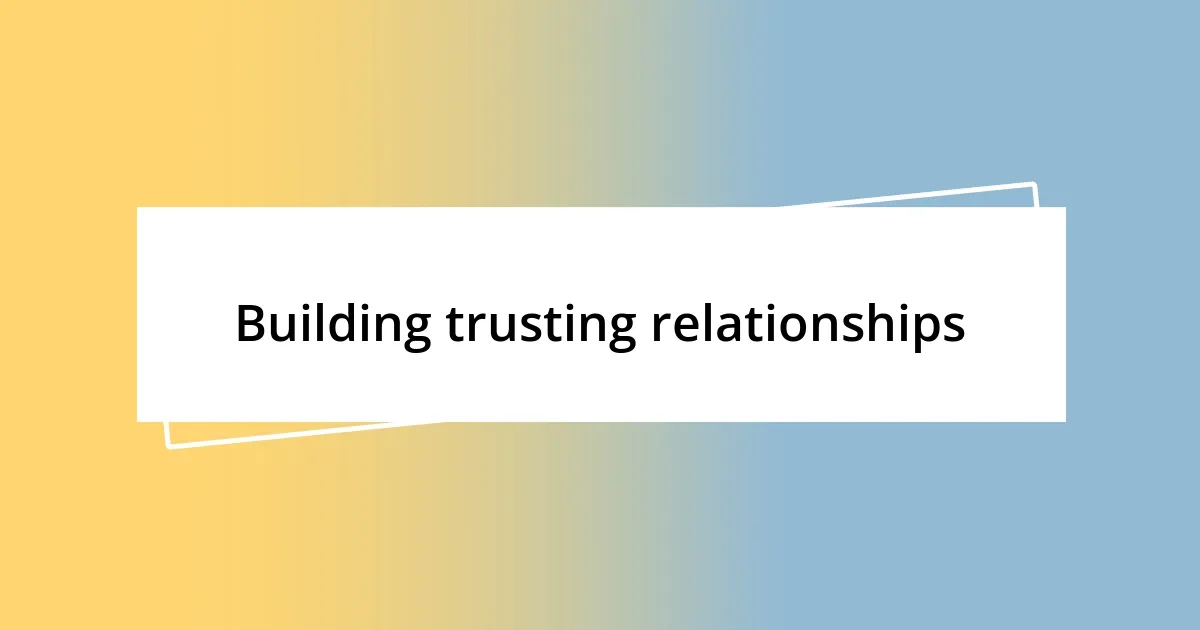
Building trusting relationships
Building trusting relationships is at the heart of any successful partnership with experts. I vividly recall a project where I partnered with an industry veteran to navigate a particularly tricky negotiation. His willingness to share his past experiences and failures created a safe space for honesty. In that environment, we built a rapport that felt more like a partnership than a simple collaboration. Can you remember a time when someone’s openness instantly made you feel more connected?
Establishing trust requires ongoing communication and genuine engagement. I learned that regularly checking in, whether through casual conversations or structured meetings, can strengthen these bonds. During one collaboration, I made it a point to share not just updates but also challenges I faced. Each time, my partner responded with compassion and practical advice, reinforcing a mutual respect that fueled our project’s success. Have you ever noticed how sharing vulnerabilities can bring people closer together? That connection propelled us forward.
Another crucial aspect is delivering on promises. I used to think that expertise alone would build trust, but I soon realized reliability is equally important. There was an instance where a deadline was missed due to unforeseen complications. Instead of hiding it, I openly discussed it with my expert partner, and together we devised a new plan. This transparent approach not only salvaged our project but also deepened our professional bond. In retrospect, such experiences showed me that trust is built not just in successful moments but in how we choose to handle the challenges that come our way.
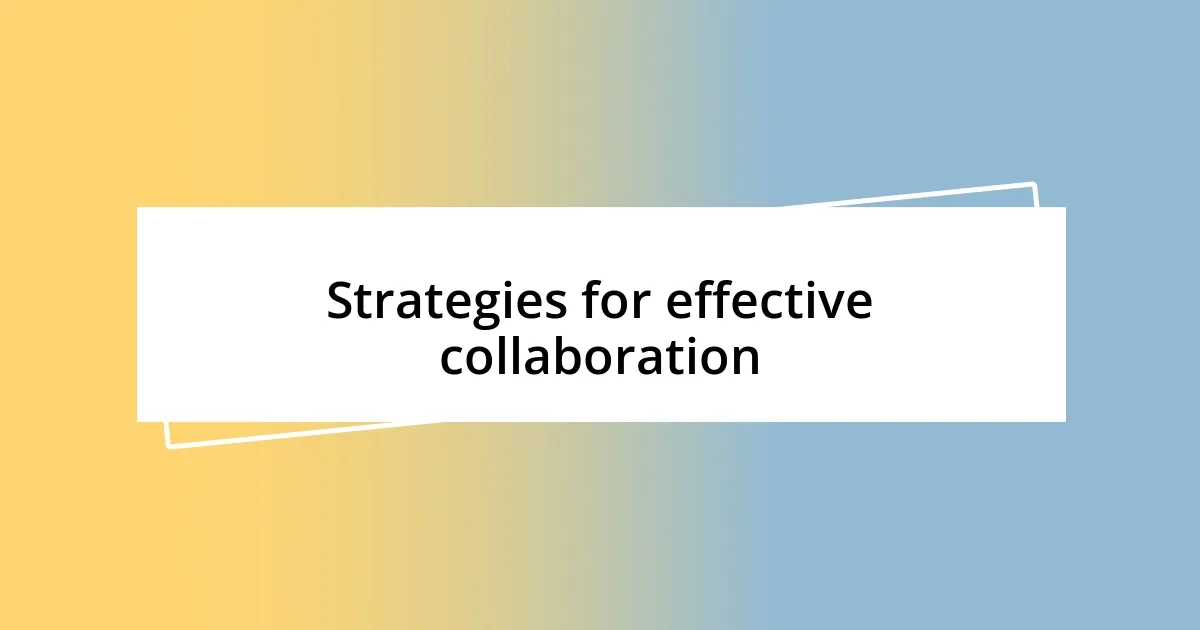
Strategies for effective collaboration
Effective collaboration thrives on open communication and active listening. I recall a project where we scheduled regular brainstorming sessions. These meetings felt less like obligatory check-ins and more like collaborative think tanks, sparking creativity. It made me wonder—how often do we genuinely allow our partners to voice their ideas fully? When everyone feels heard, it creates a fertile ground for innovative solutions.
Another strategy that proved invaluable was defining clear roles and expectations from the start. Early in my career, I partnered with a technical expert without explicitly outlining responsibilities. This led to confusion, delays, and frustration on both sides. Once I learned to set clear parameters, I discovered that not only did our efficiency improve, but our mutual respect grew. Why do we sometimes hesitate to establish these boundaries? Perhaps it’s the fear of limiting creativity, but in reality, it can enhance autonomy within the structure.
Finally, I find that celebrating small wins together can significantly enhance team morale. I remember completing a key milestone during a long-term project, and we took a moment to acknowledge that achievement with a casual lunch. It seemed so simple, yet this recognition built a sense of shared purpose. Have you ever celebrated a small success that transformed the energy of a project? These moments remind us of our progress and build enthusiasm for the journey ahead.
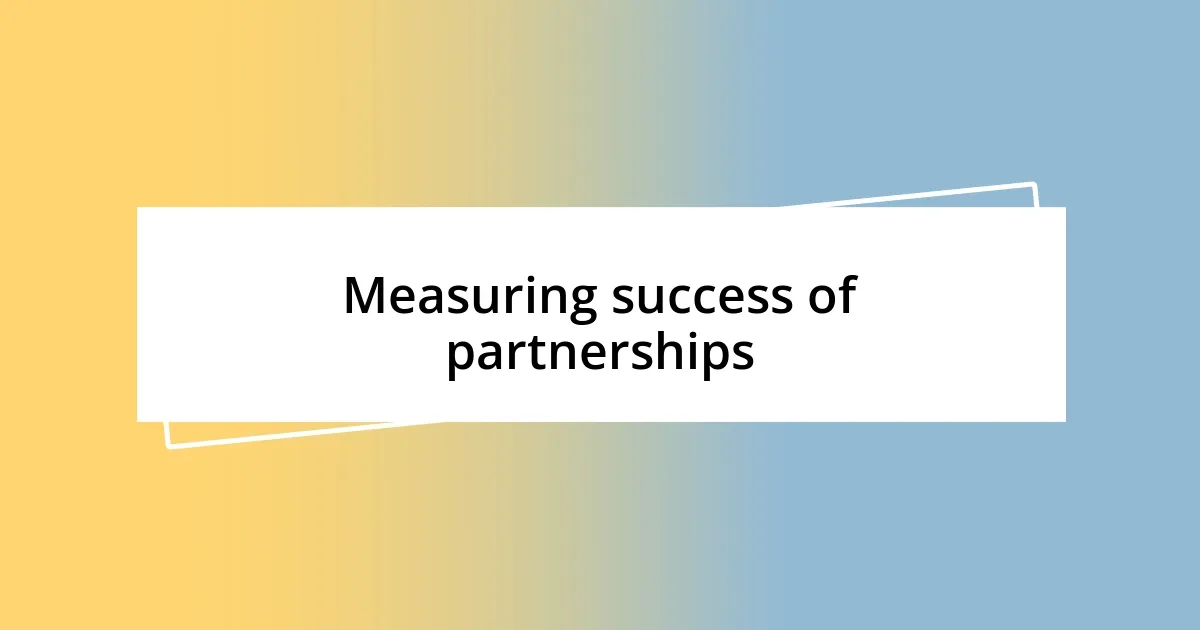
Measuring success of partnerships
Measuring the success of partnerships is often more nuanced than just delivery on project goals. In one collaboration, I realized that metrics like increased revenue or completed milestones don’t tell the whole story. Reflecting on our journey, I found that feedback from all partners played a crucial role in understanding how effectively we worked together. Have you ever questioned whether a project really met its potential, despite appearing successful on paper?
Often, I gauge success by the quality of interactions and the growth each partner experiences. During a challenging project, I took time to assess how we adapted to obstacles together. I noticed that every conflict we resolved made us stronger, deepening my appreciation for my partner’s expertise and insights. Isn’t it fascinating how overcoming difficulties can transform a partnership into a more resilient alliance?
Lastly, I find that successful partnerships create a legacy beyond the immediate results. For instance, after one project, we both prioritized mentoring others in our fields, inspired by what we learned from each other. This ripple effect of knowledge-sharing demonstrated that our collaboration was successful, not just in the short term, but in contributing positively to our professional communities. Have you ever reflected on the lasting impacts of a partnership you’ve been a part of? The true measure of success often lies in the relationships forged and the inspiration ignited.
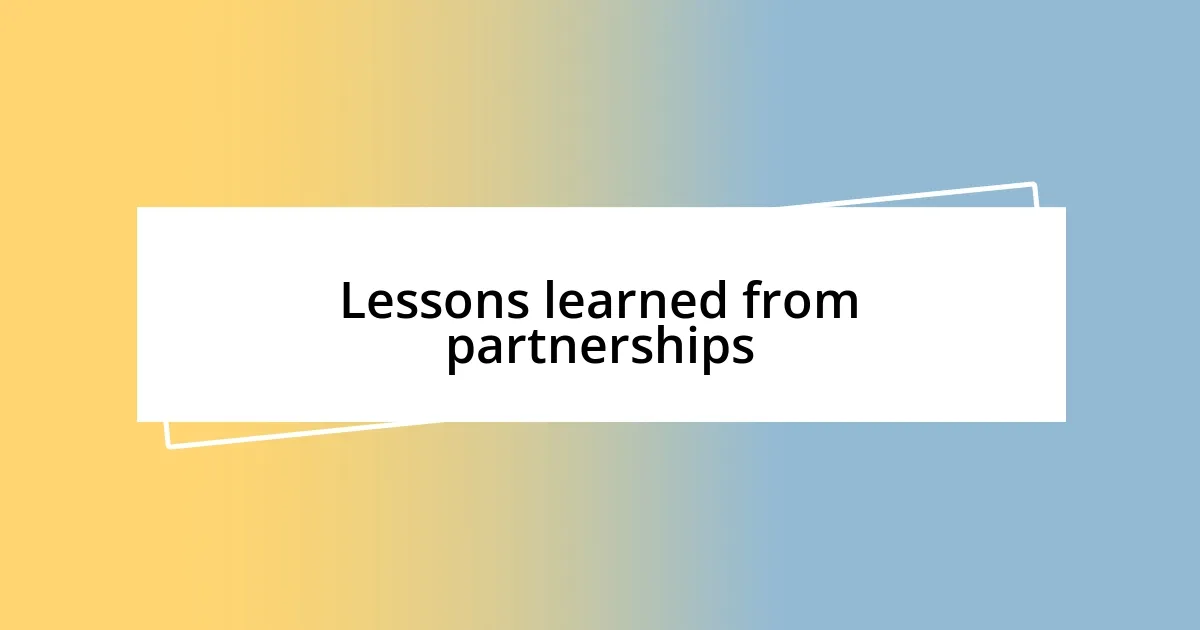
Lessons learned from partnerships
Sometimes, I’ve learned that partnerships are as much about patience as they are about collaboration. I recall a situation where we were working on a project that involved multiple stakeholders with differing visions. It felt frustrating at times to navigate those conflicting ideas, but I soon realized that allowing space for each partner’s perspective led to richer discussions. Isn’t it interesting how, by slowing down and being patient, we can often uncover innovative paths that we might have rushed past otherwise?
Another lesson that stands out is the importance of trust in partnerships. In one collaboration, I found myself unsure whether to express my doubts about a proposed strategy. Once I worked up the courage to share my concerns, it opened up a dialogue that not only clarified our objectives but strengthened our bond as partners. Can you think of a time when a moment of vulnerability transformed your relationship with a colleague? Trust is built through open exchanges, and I’ve come to appreciate that real growth happens when we allow ourselves to be candid.
Finally, I often reflect on how essential it is to embrace flexibility in any partnership. There was a project where we had to pivot completely due to unforeseen challenges. Initially, the change felt daunting, but by embracing the unexpected and being willing to adapt, we actually ended up creating a more innovative solution than we initially envisioned. Have you ever faced a similar situation where letting go of the original plan led you to surprising heights? It’s a reminder that great partnerships thrive on adaptability, helping each member rise to new levels of creativity.
